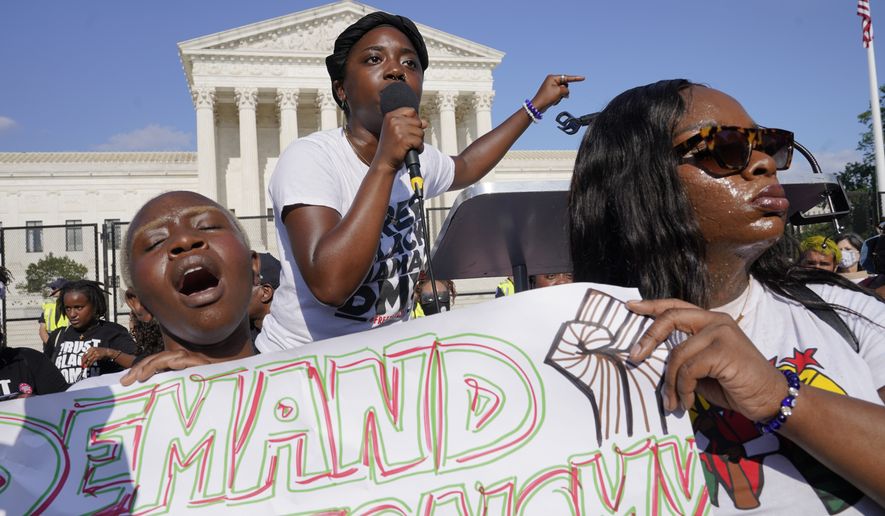Americans should fear what comes next, the three dissenting justices wrote Friday in excoriating the Supreme Court’s ruling overturning nearly 50 years of abortion precedent.
Justices Stephen G. Breyer, Sonia Sotomayor and Elena Kagan said if Roe v. Wade can be overturned, there’s little safety for rights to contraception, to same-sex marriage, or even to interracial marriage.
They said they held “sorrow” for both the Supreme Court itself and “for the many millions of American women who have today lost a fundamental constitutional protection.”
“The Court’s precedents about bodily autonomy, sexual and familial relations, and procreation are all interwoven — all part of the fabric of our constitutional law, and because that is so, of our lives. Especially women’s lives, where they safeguard a right to self-determination,” the justices wrote in their joint dissent.
The case before the court stemmed from a Mississippi law that generally barred women from obtaining an abortion after 15 weeks of pregnancy. That challenged Roe and a later 1992 case, Casey, which held that women had a mostly unfettered right to abortion up until “viability” of the fetus.
Justice Samual A. Alito Jr., writing the majority opinion Friday, said not only was the viability standard bad legal precedent, but so was the entirety of Roe. He said no right to abortion is found in the Constitution, nor was it countenanced by the framers and ratifiers of the 14th Amendment, which is where the Roe court in 1973 placed the basis for a national right to privacy that abortion rights sprung from.
“Until the latter part of the 20th century, such a right was entirely unknown in American law,” Justice Alito wrote.
He eviscerated the legal basis for Roe, and pointed to myriad constitutional scholars, particularly on the political left, who have also argued the “weaknesses” in Roe. And he said the Casey decision reaffirmed Roe not as strong a legal argument, but rather because it had become enshrined precedent.
The dissenters Friday took the same path as the Casey court, casting Roe less as a tour de force of legal reasoning and more as a “balancing” act — and one that the country had come to accept, albeit uneasily for many.
“The majority has no good reason for the upheaval in law and society it sets off,” the dissenters wrote. “Roe and Casey have been the law of the land for decades, shaping women’s expectations of their choices when an unplanned pregnancy occurs. Women have relied on the availability of abortion both in structuring their relationships and in planning their lives. The legal frame-work Roe and Casey developed to balance the competing interests in this sphere has proved workable in courts across the country. No recent developments, in either law or fact, have eroded or cast doubt on those precedents. Nothing, in short, has changed.”
The dissenters wondered what the majority would think if the court were to countenance a similar move in the realm of guns, by allowing New York or California “to ban all the guns they want,” or the realm of religious practice, allowing states “to put restrictions on church attendance.”
“When the Court decimates a right women have held for 50 years, the Court is not being ‘scrupulously neutral.’ It is instead taking sides: against women who wish to exercise the right, and for States (like Mississippi) that want to bar them from doing so,” the dissenters wrote.
What comes next for the court was heatedly debated across the 213 pages of opinions released Friday.
Justice Brett M. Kavanaugh, in his concurring opinion, said lines can be drawn to prevent erosion of other rights.
“Overruling Roe does not mean the over-ruling of those precedents, and does not threaten or cast doubt on those precedents,” he said.
He said, for example, that a state couldn’t even bar someone from traveling to another state to get an abortion, so states where it is legal will still be able to serve anyone who wants one.
But the dissenters pointed to Justice Clarence Thomas, who in his own concurring opinion said decisions involving same-sex relations, marriage and the right to contraception should be reevaluated at an appropriate time. He said those rulings rested on substantive due process, the same argument used by the Roe court.
“As I have previously explained, ‘substantive due process’ is an oxymoron that ‘lack[s] any basis in the Constitution,’” he wrote.
He called the contraceptive and same-sex relations rulings “demonstrably erroneous.”
The dissenters figured Justice Thomas was right and the pendulum won’t stop swinging here.
Indeed, they pointed to some of their own decisions where they ratcheted rights up.
In a 2003 case striking down a Texas law banning “homosexual content,” Justice Antonin Scalia warned the court it was paving the way for same-sex marriage. Little more than a decade later, he was proved right when the court in the Obergefell decision established that right.
“We fervently hope that does not happen because of today’s decision,” the dissenters wrote. “We hope that we will not join Justice Scalia in the book of prophets. But we cannot understand how anyone can be confident that today’s opinion will be the last of its kind.”
• Stephen Dinan can be reached at sdinan@washingtontimes.com.
• Alex Swoyer can be reached at aswoyer@washingtontimes.com.




Please read our comment policy before commenting.